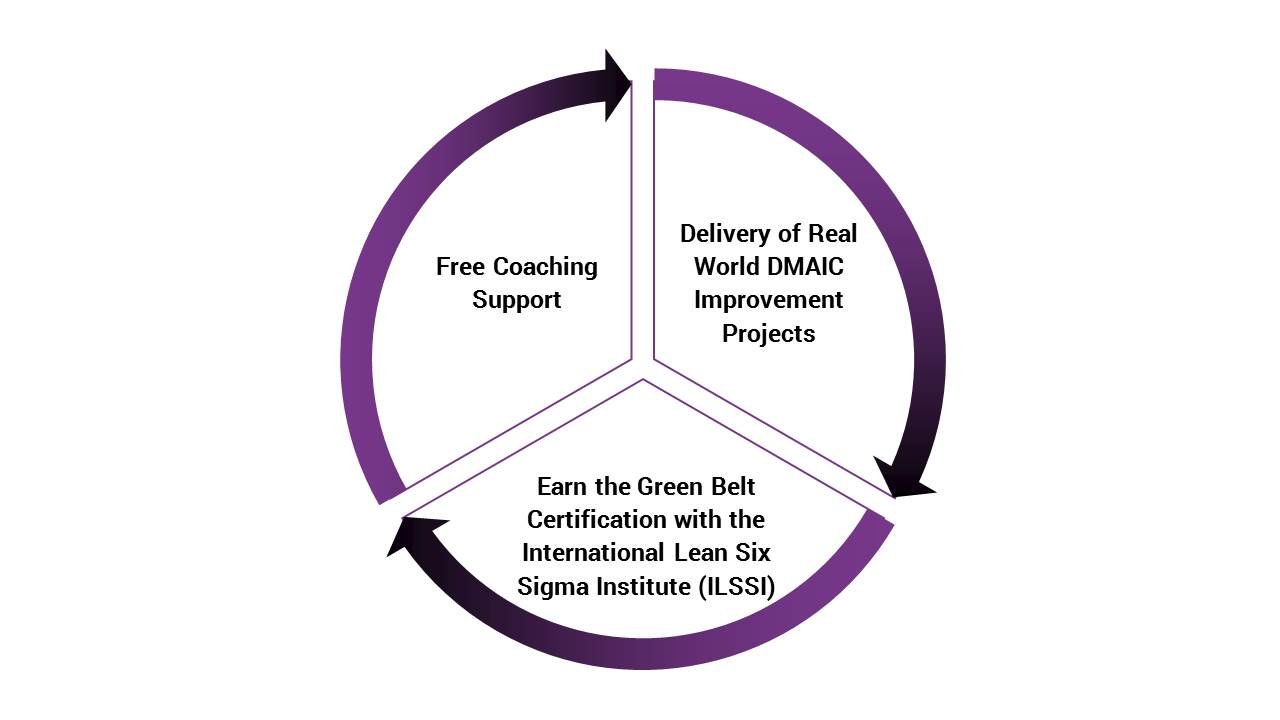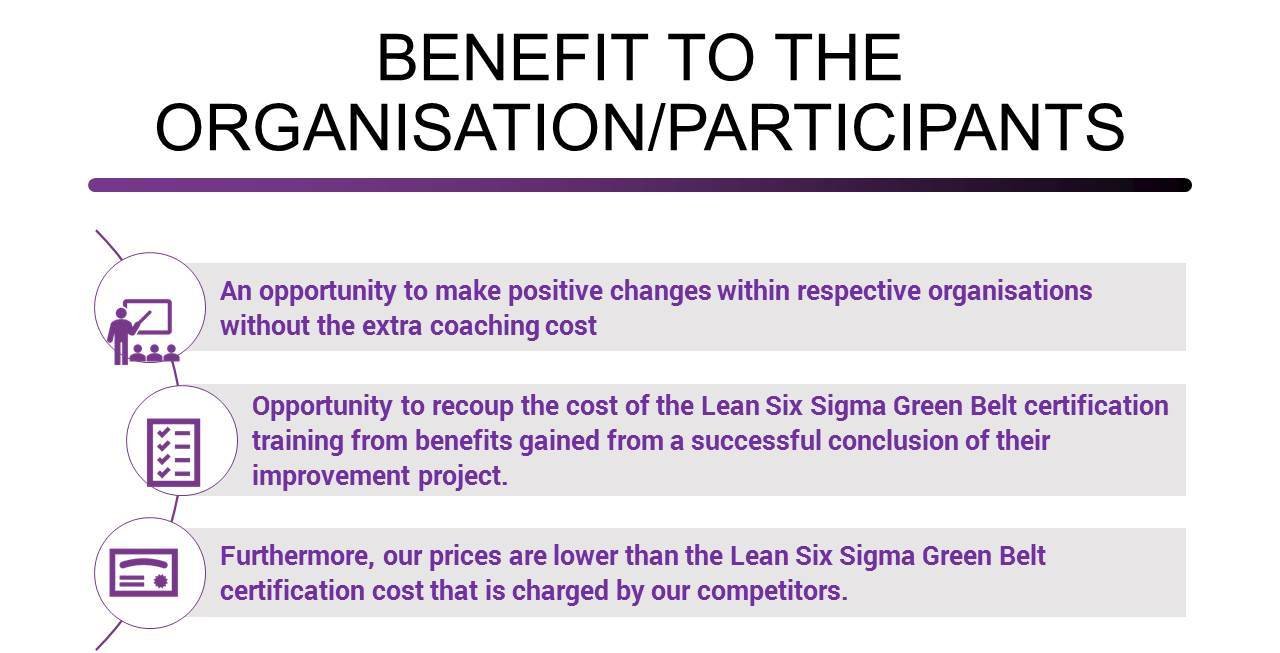4 Secrets on Lean Six Sigma Green Belt Training Today
WHAT IS LEAN SIX SIGMA GREEN BELT?
[youtube v=”RVrskDolhKY”]
The answer to the question – what is Six Sigma Green Belt – is sometimes desired by those who want to understand how to attain the differing levels of the Lean Six Sigma methodology.
The Lean Six Sigma Green Belt holder, being a practitioner of the Lean Six Sigma methodology, learns the practicability and usability of the various tools and techniques taught at the Lean Six Sigma Green Belt training. With the association to belt levels coming from the Six Sigma belt training, the Six Sigma Green Belt holder delivers process improvement to respond to problems in an organisation.
The training and certification programme for Green Belts at MakeWay Global stipulates the delivery of real world DMAIC improvement projects (MakeWay provides free coaching support) after the training event, to earn the Green Belt certification with the International Lean Six Sigma Institute (ILSSI).

The Lean Six Sigma Green Belt Body of Knowledge, which builds on what is taught on the Yellow Belt syllabus at MakeWay Global, encompasses the tools and techniques of the framework and lays emphasis on the use of the DMAIC methodology. It is an array of topics that form the minimum competencies and core proficiencies of the Lean Six Sigma Green Belt learning.
The Lean Six Sigma Green Belt training focuses on the following, and more:
- provide additional understanding of the skills and tools necessary to direct small groups of people in the Lean 6 Sigma environment
- learn how to use the tools and techniques of Lean Six Sigma within a DMAIC framework
- introduce practical statistical solutions appropriate to Green Belt holders
- practise using tools in real world situations
- show how to attain a measurable (financial/non-financial) and significant business impact through their improvement projects
- to help prepare learners to undertake a Green Belt DMAIC improvement project after the training session

We provide quality certification material – study material for Lean Six Green Belt, which the participants at our training sessions get to keep. Further, we have the Lean Six Sigma Green belt training – online course, which allows you to study at your pace and sit the examination that follows. MakeWay Global will also provide support, free of charge, to achieve your first improvement project that will deliver the required benefit to you and your organisation.
Do you have to take a test for a Lean Six Sigma Green Belt?
The Lean Six Sigma Green Belt certification, as a practitioner level, does not have to be a test-based or exam-based qualification. At MakeWay Global, participants are required to conduct a post course improvement project, which is supported at no extra cost. Accepted and reviewed for the Green Belt certification by the International Lean Six Sigma Institute (ILSSI), it is a demonstration of the knowledge acquired at this practitioner level of the framework.

Which Green Belt certification is best?
Many training organisations provide examinations at the end of the Lean Six Sigma Green Belt course as a test of the knowledge acquired during the training event. At MakeWay Global, we have a different view of this. We believe that a guided implementation of the Lean Six Sigma framework with practical improvement projects at the participants’ own domain lends credence to the ensuing benefits. This is well portrayed in the GE story.
The GE story of Six Sigma success – In 2001, Jack Welch, the executive chairman of GE, announced that they had trained over 80,000 of their employees and completed over 500,000 improvement projects. The model at GE was such that certification at the Green Belt level was based on having completed an improvement project. In fact, apparently, sometime after GE had adopted Six Sigma in 1995, no one could be promoted to a managerial position without having achieved a Green Belt certification.
The story of GE’s success, having been attributed to the Six Sigma framework, thereafter, hit Wall Street. The consequence was a surge in Six Sigma training by consultants and trainers that swapped the practicality of improvement projects for classroom examinations. Sadly, this resulted in gross inability of trained participants to implement what had been learnt in the classroom, and organisations began to lose faith in the methodology, having spent a lot of money on training their employees. Alas, it was not the methodology that had the problem, it was the approach to it that was warped.
The approach of free coaching guidance for the first Green Belt improvement project after the training session, is a factor that sets MakeWay Global apart, and it has been popular with a number of our clients. On submission of the activity that was undertaken to conduct the improvement project, this is assessed by the International Lean Six Sigma Institute and thereafter, if judged to meet the criteria for a DMAIC improvement project, the candidate obtains the accredited Lean Six Sigma Green Belt certification.

Our clients see this as an opportunity, which they have taken advantage of, to make positive changes in their respective organisations without the extra coaching cost. Needless to say, they recoup the cost of the Lean Six Sigma Green Belt certification cost from the benefits gained from a successful conclusion of their improvement project.
Furthermore, our prices are lower than the Lean Six Sigma Green Belt certification cost that is charged by our competitors – see our online self-study course prices here and the classroom/virtual instructor-led course prices here.
Do you need a Six Sigma Green Belt before Black Belt?
In the Lean Six Sigma Belt levels, the Green Belt certification is attained before the Black Belt certification can be achieved. And prior to the Green Belt, you would have achieved the Yellow Belt certification. It is worth noting that you can register for the Black Belt certification without having achieved the Green Belt or Yellow Belt certifications. The topics that are taught in the lower levels are reinforced in the higher levels.
So, in the same vein, you can register for the Green Belt certification prior to achieving the Yellow Belt.
Do remember though that, the completion of an improvement project is vital for the accredited certification with each respective level. The Lean Six Sigma Green Belt certification is designed for both project managers and non-project managers – an important aspect in the culture of continuous improvement within an organisation.
In your learning of the Six Sigma framework, you will find that Lean Six Sigma (L6S) is a fusion between Lean and Six Sigma. It is a problem solving framework, which is based on a culture of continuous improvement that delivers significant benefit to an organisation. You can read more about it here.
Learn how to excel at leadership and management
Sign up for our newsletter and get access to a broad range of training information and materials which will help to improve your business processes and career prospects.


Clients
















After payment, please send an email to connect@makewayglobal.com with (Name, Email Address and Telephone Number) or call +44 20 3858 3600.
Your confirmation will be e-mailed to you. Review it for accuracy and bring it with you to the training venue. Your confirmation verifies your course registration. Seating is limited. Refreshments and training resource kits are included in training fees.
TRANSFERS AND CANCELLATION POLICY
Transfers are permitted one time only within the calendar year. Transfer requests must be submitted in writing via e-mail no later than 7 business days before the programme start date. You may transfer into another training event that will be held before September 30, 2027. If you are unable to send a replacement, you forfeit your registration fee. If you are unable to attend the programme to which you transfer, you may send a replacement. All transfers and cancellations must be made in writing to connect@makewayglobal.com


